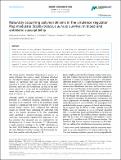Files in this item
Naturally occurring polymorphisms in the virulence regulator Rsp modulate Staphylococcus aureus survival in blood and antibiotic susceptibility
Item metadata
| dc.contributor.author | Krishna, Aishwarya | |
| dc.contributor.author | Holden, Matthew T G | |
| dc.contributor.author | Peacock, Sharon J | |
| dc.contributor.author | Edwards, Andrew M | |
| dc.contributor.author | Wigneshweraraj, Sivaramesh | |
| dc.date.accessioned | 2018-08-06T10:30:05Z | |
| dc.date.available | 2018-08-06T10:30:05Z | |
| dc.date.issued | 2018 | |
| dc.identifier.citation | Krishna , A , Holden , M T G , Peacock , S J , Edwards , A M & Wigneshweraraj , S 2018 , ' Naturally occurring polymorphisms in the virulence regulator Rsp modulate Staphylococcus aureus survival in blood and antibiotic susceptibility ' , Microbiology , vol. 164 , no. 9 , pp. 1189-1195 . https://doi.org/10.1099/mic.0.000695 | en |
| dc.identifier.issn | 1350-0872 | |
| dc.identifier.other | PURE: 255190919 | |
| dc.identifier.other | PURE UUID: 3b4b1980-2a0f-4e52-ac73-c52a1dd3acae | |
| dc.identifier.other | PubMed: 30028663 | |
| dc.identifier.other | Scopus: 85053261751 | |
| dc.identifier.other | ORCID: /0000-0002-4958-2166/work/60196453 | |
| dc.identifier.other | WOS: 000453301000012 | |
| dc.identifier.uri | https://hdl.handle.net/10023/15771 | |
| dc.description | This work was funded by the Imperial College President’s Scholarship awarded to A. K; M. T. G.H acknowledges funding from Chief Scientists Office (Grant Number SIRN10); S. J. P thanks the UKCRC Translational Infection Research Initiative and the Medical Research Council (Grant Number G1000803) for funding to cover the original isolate collection; A. M. E acknowledges funding from the Royal Society, Department of Medicine (Imperial College), and from the Imperial NIHR Biomedical Research Centre, Imperial College London; S.W is a recipient of a Wellcome Trust Investigator Award. | en |
| dc.description.abstract | Nasal colonization by the pathogen Staphylococcus aureus is a risk factor for subsequent infection. Loss of function mutations in the gene encoding the virulence regulator Rsp are associated with the transition of S. aureus from a colonizing isolate to one that causes bacteraemia. Here, we report the identification of several novel activity-altering mutations in rsp detected in clinical isolates, including for the first time, mutations that enhance agr operon activity. We assessed how these mutations affected infection-relevant phenotypes and found loss and enhancement of function mutations to have contrasting effects on S. aureus survival in blood and antibiotic susceptibility. These findings add to the growing body of evidence that suggests S. aureus 'trades off' virulence for the acquisition of traits that benefit survival in the host, and indicates that infection severity and treatment options can be significantly affected by mutations in the virulence regulator rsp. | |
| dc.format.extent | 7 | |
| dc.language.iso | eng | |
| dc.relation.ispartof | Microbiology | en |
| dc.rights | © 2018 The Authors. This is an open-access article distributed under the terms of the Creative Commons Attribution License, which permits unrestricted use, distribution, and reproduction in any medium, provided the original work is properly cited. | en |
| dc.subject | Virulence regulator | en |
| dc.subject | Bacteraemia | en |
| dc.subject | Staphylococcus aureas | en |
| dc.subject | Rsp | en |
| dc.subject | Mutations | en |
| dc.subject | QR Microbiology | en |
| dc.subject | NDAS | en |
| dc.subject.lcc | QR | en |
| dc.title | Naturally occurring polymorphisms in the virulence regulator Rsp modulate Staphylococcus aureus survival in blood and antibiotic susceptibility | en |
| dc.type | Journal article | en |
| dc.description.version | Publisher PDF | en |
| dc.contributor.institution | University of St Andrews. Infection and Global Health Division | en |
| dc.contributor.institution | University of St Andrews. Biomedical Sciences Research Complex | en |
| dc.contributor.institution | University of St Andrews. Infection Group | en |
| dc.contributor.institution | University of St Andrews. School of Medicine | en |
| dc.identifier.doi | https://doi.org/10.1099/mic.0.000695 | |
| dc.description.status | Peer reviewed | en |
This item appears in the following Collection(s)
Items in the St Andrews Research Repository are protected by copyright, with all rights reserved, unless otherwise indicated.

